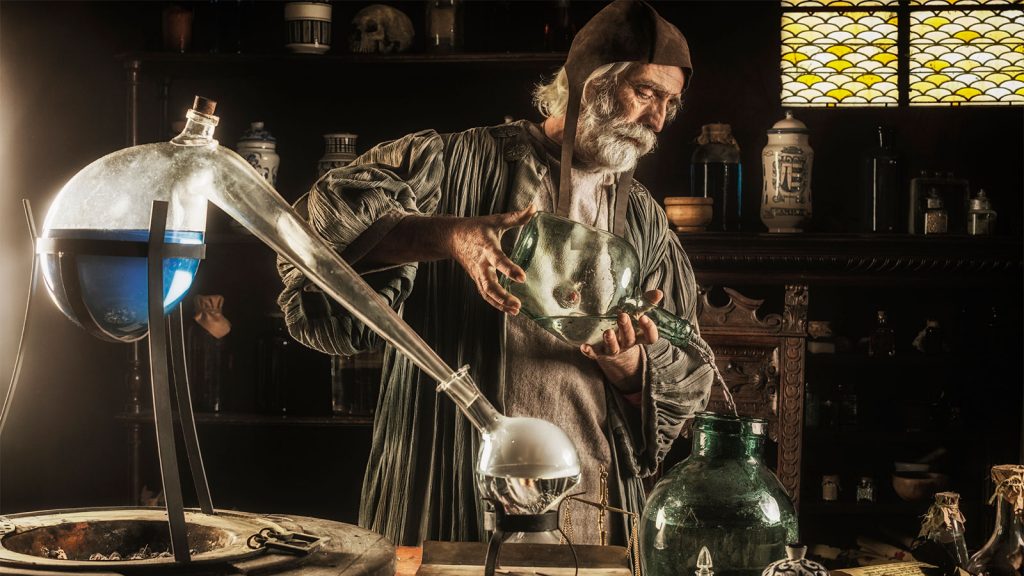
For more than 4,000 years, on three different continents, many of the smartest people in the world pursued a dream.
They yearned to turn ordinary junk into treasure. It was the dream of alchemy. Through a combination of research, magic, and laboratory trial-and-error, alchemists in China, India, the Middle East, and medieval Europe searched for the mythical “philosopher’s stone” – a substance that could transmute ordinary metals like lead into an endless supply of precious metals like silver and gold.
No one knew exactly what the philosopher’s stone looked like. It was rumored to be orange and exceedingly heavy. When ground, it was supposed to yield a fine red powder that could dissolve in any liquid and withstand the heat of any furnace.
Everyone agreed that when they finally had the stone in hand, it would prove to be the ultimate key to human joy.
The stone was also called “the elixir of life,” because it would be able to resurrect dead plants and animals. It would heal every human disease and grant its owner immortality (much like the mythical Fountain of Youth). Common salt crystals would be transmuted into diamonds, and (interestingly) the stone would somehow generate perfect representations, or clones, of the one who possessed it.
The stakes were high. The rewards unimaginable. Many of history’s brightest minds devoted their best years to pursuing the Magnum Opus (“great work”) of finding the philosopher’s stone. Sir Isaac Newton – arguably the smartest guy who has ever lived – spent more time researching alchemy than either physics or optics. Sir Robert Boyle, one of Newton’s contemporaries and widely regarded as the father of modern chemistry, was first and foremost an alchemist.
Note that the root chem (a Greek word that connotes “the art of alloying metals”) is at the heart of both chemistry and alchemy. The former discipline became wholly legitimate. The latter has now been wholly discredited.
Contemporary scientists assure us that the philosopher’s stone does not exist. It never did. There is no magical “something” than can change the ordinary into the extraordinary.
But, of course, that very claim is at the heart of Christian spirituality.
The apostle Paul insists that those who follow Jesus “are being transformed into his image with ever-increasing glory, which comes from the Lord, who is the Spirit” (2 Corinthians 3:18). The Spirit slowly but surely “transmutes” our thoughts, attitudes, and actions into those that honor God.
What might that look like?
Your spouse has infuriated you. You’re about to retreat again into your fantasies – you know, the narrative where you’re with that other person you realize you should have married, and now you’re so very happy. But because Jesus calls you to faithfulness, you decide not to go there. You turn back again to try to listen and to love your partner as best you can.
You flip on the TV and that politician you cannot stand is getting more national exposure. It used to be just that you couldn’t endure that person’s political views. Now you cannot even hear the sound of their voice without cringing. But because Jesus calls you to love those whom you perceive to be enemies, you stop this time. You choose to pray that God will somehow bless this person.
You bristle at work because once again that arrogant, self-serving member of your team has stolen your thunder, invaded your space, and said things to management that put you in a bad light. When others in the office who have been similarly offended have gathered for coffee and are gleefully pouring on the abuse behind that person’s back, you’re just about to chime in when you remember that Jesus is your Master. Strengthened by the Spirit, you choose not to say the things you were going to say.
You walk through the mall or the bank or your school’s cafeteria and you see that person who’s always on the outs – whose looks or race or hygiene or behavior inevitably seems to put up walls. But because Jesus calls you to love people the way that he loves people, you stop this time. You ask about their life and their concerns. Just by paying attention, you make their day.
For four millennia, people all over the world cherished the dream of alchemy. Surely some kind of exotic chemistry could be found to transform everyday junk into gold.
But no one ever succeeded.
Except for God.
He is the Alchemist who can take whatever junk is in our hearts and minds and, through the grace of his Son, transform it into something eternally beautiful.
